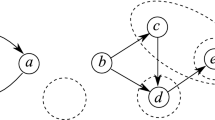Abstract
In this paper, we prove the correspondence between complete extensions in abstract argumentation and 3-valued stable models in logic programming. This result is in line with earlier work of [6] that identified the correspondence between the grounded extension in abstract argumentation and the well-founded model in logic programming, as well as between the stable extensions in abstract argumentation and the stable models in logic programming.
Similar content being viewed by others
References
Caminada, M.W.A., ‘On the issue of reinstatement in argumentation’, in M. Fischer, W. van der Hoek, B. Konev, and A. Lisitsa, (eds.), Logics in Artificial Intelligence; 10th European Conference, JELIA 2006, Springer, 2006, pp. 111–123. LNAI 4160.
Caminada, M.W.A., ‘On the issue of reinstatement in argumentation’, Technical Report UU-CS-2006-023, Institute of Information and Computing Sciences, Utrecht University, 2006.
Caminada, M.W.A., ‘Semi-stable semantics’, in P.E. Dunne and T.J.M. Bench-Capon, (eds.), Computational Models of Argument; Proceedings of COMMA 2006, IOS Press, 2006, pp. 121–130.
Caminada, M.W.A., ‘An algorithm for computing semi-stable semantics’, in Proceedings of the 9th European Conference on Symbolic and Quantitalive Approaches to Reasoning with Uncertainty (ECSQARU 2007), number 4724 in Springer Lecture Notes in AI, Berlin, Springer Verlag, 2007, pp. 222–234.
Caminada M.W.A., L. Amgoud (2007) ‘On the evaluation of argumentation formalisms’. Artificial Intelligence 171(5-6): 286–310
Dung P.M. (1995) ‘On the acceptability of arguments and its fundamental role in nonmonotonic reasoning, logic programming and n-person games’. Artificial Intelligence 77: 321–357
Dung P.M., Mancarella P., Toni F. (2007) ‘Computing ideal sceptical argumentation’. Artificial Intelligence 171(10-15): 642–674
Eiter T., Leone N., Saccá D. (1997) ‘On the partial semantics for disjunctive deductive databases’. Ann. Math. Artif. Intell. 19(1-2): 59–96
Gabbay D.M., Garcez A. (2009) ‘Logical modes of attack in argumentation networks’. Studia Logica 93(2-3): 199–230
Jakobovits H., Vermeir D. (1999) ‘Robust semantics for argumentation frameworks’. Journal of logic and computation 9(2): 215–261
Pollock J.L. (1995) Cognitive Carpentry A Blueprint for How to Build a Person. MIT Press, Cambridge, MA
Prakken, H., ‘An abstract framework for argumentation with structured arguments’, Technical Report UU-CS-2009-019, Department of Information and Computing Sciences, Utrecht University, 2009.
Prakken H., Sartor G. (1997) ‘Argument-based extended logic programming with defeasible priorities’. Journal of Applied Non-Classical Logics 7: 25–75
Przymusinski T.C. (1990) ‘The well-founded semantics coincides with the three-valued stable semantics’. Fundamenta Informaticae 13(4): 445–463
Verheij, B., ‘A labeling approach to the computation of credulous acceptance in argumentation’, in Manuela M. Veloso, editor, Proceedings of the 20th International Joint Conference on Artificial Intelligence, Hyderabad, India, 2007, pp. 623–628.
Vreeswijk, G.A.W., ‘An algorithm to compute minimally grounded and admissible defence sets in argument systems’, in P.E. Dunne and T.J.M. Bench-Capon, (eds.), Computational Models of Argument; Proceedings of COMMA 2006, IOS, 2006, pp. 109–120.
Author information
Authors and Affiliations
Corresponding author
Rights and permissions
About this article
Cite this article
Wu, Y., Caminada, M. & Gabbay, D.M. Complete Extensions in Argumentation Coincide with 3-Valued Stable Models in Logic Programming. Stud Logica 93, 383 (2009). https://doi.org/10.1007/s11225-009-9210-5
Published:
DOI: https://doi.org/10.1007/s11225-009-9210-5



